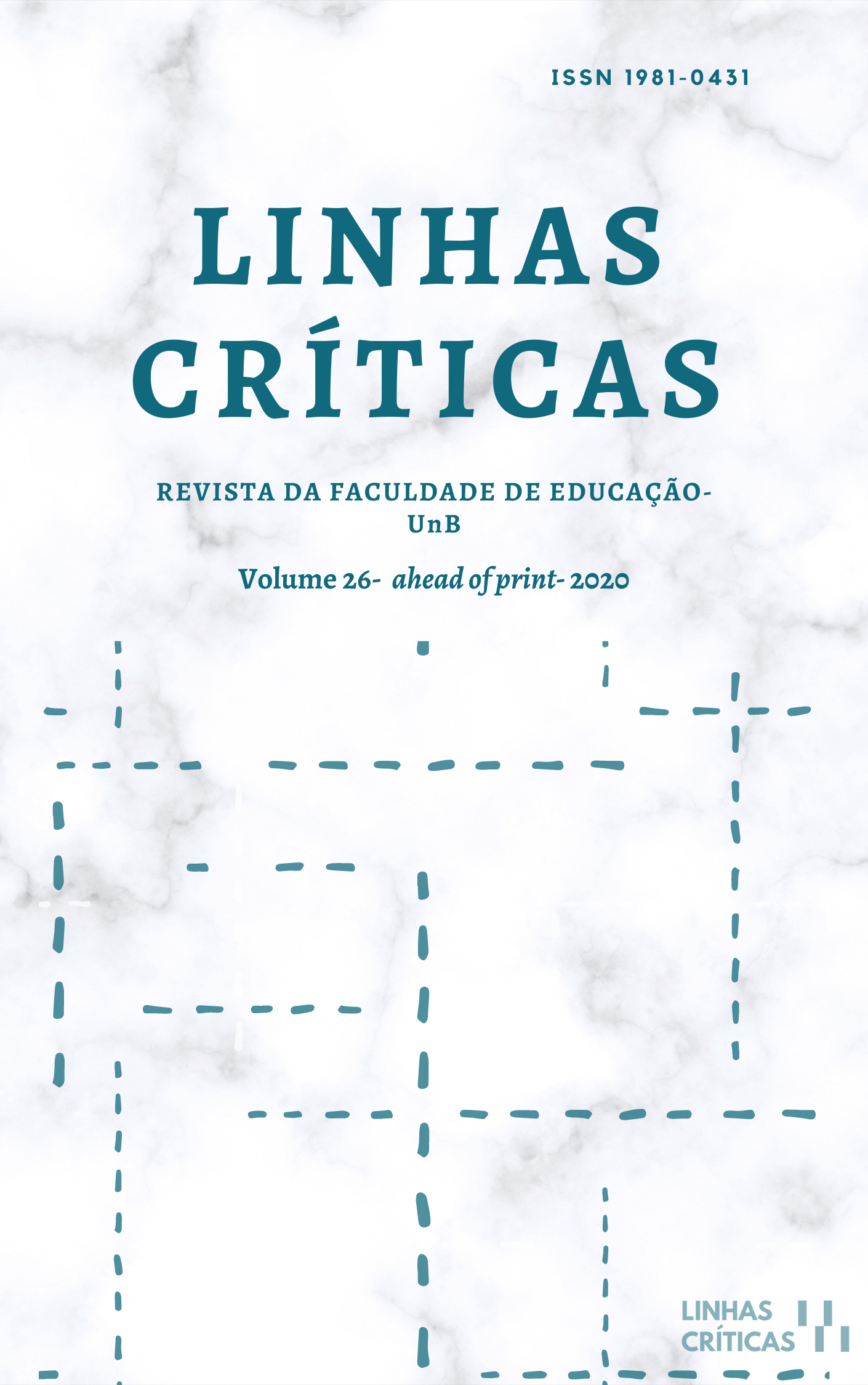From the presential to the emergential remote
transits of early childhood education in the pandemic
DOI:
https://doi.org/10.26512/lc.v26.2020.36262Keywords:
Early Childhood Education, Pandemic, Technology, Digital Culture, Remote teachingAbstract
This article aims to take a look at the transit of the early childhood school to the remote emergency mode due to the Covid-19 pandemic. Based on the understanding that this condition cannot be considered child education in its entirety, the uses of technological resources and strategies adopted by schools were analyzed based on theoretical discussion and interviews with managers. The remote circumstantial solution sought to guarantee the maintenance of affective bonds and the school as a project, in addition to connections with culture and knowledge. The analysis revealed possibilities and limits of the relationship with technologies and illuminated aspects of the relationship between school and families.
Downloads
References
Anjos, C. I., & Francisco, D. J. (2021). Educação infantil e tecnologias digitais: reflexões em tempos de pandemia. Zero-a-Seis, 23,(Esp), 125-146. https://doi.org/10.5007/1980-4512.2021.e79007
Brasil. (1996). Lei n. 9.394 de 20 de dezembro de 1996 (Estabelece a Lei de Diretrizes e Bases da Educação Nacional). Presidência da República. Casa Civil. http://www.planalto.gov.br/ccivil_03/leis/l9394.htm
Brasil. (2009). Resolução Nº 5, de 17 de dezembro de 2009. Ministério da Educação. Conselho Nacional de Educação. Câmara de Educação Básica. http://portal.mec.gov.br/index.php?option=com_docman&view=download&alias=2298-rceb005-09&category_slug=dezembro-2009-pdf&Itemid=30192
Brasil. (2014). Lei n. 13.005 de 25 de junho de 2014 (Aprova o Plano Nacional de Educação - PNE e dá outras providências). Presidência da República. Casa Civil. http://www.planalto.gov.br/ccivil_03/_ato2011-2014/2014/lei/l13005.htm
Brasil. (2020a). Lei n. 14.040, de 18 de agosto de 2020 (Estabelece normas educacionais excepcionais a serem adotadas durante o estado de calamidade pública reconhecido pelo Decreto Legislativo nº 6, de 20 de março de 2020; e altera a Lei nº 11.947, de 16 de junho de 2009). Presidência da República. Secretaria-Geral. Subchefia para Assuntos Jurídicos. https://www.in.gov.br/en/web/dou/-/lei-n-14.040-de-18-de-agosto-de-2020-272981525
Brasil. (2020b). Parecer homologado. Despacho do Ministro, publicado no D.O.U. de 10/12/2020 (Reexame do Parecer CNE/CP nº 15, de 6 de outubro de 2020, que tratou das Diretrizes Nacionais para a implementação dos dispositivos da Lei nº 14.040, de 18 de agosto de 2020, que estabelece normas educacionais excepcionais a serem adotadas durante o estado de calamidade pública reconhecido pelo Decreto Legislativo nº 6, de 20 de março de 2020). Ministério da Educação. Conselho Nacional de Educação/Conselho Pleno. http://portal.mec.gov.br/index.php?option=com_docman&view=download&alias=167131-pcp019-20&category_slug=dezembro-2020-pdf&Itemid=30192
Buzato, M. (2010). Cultura digital, Educação e Letramento: conflitos, desafios, perspectivas. Em C. Höfling (org.). Jornada de Letras. Editora da UFSCar.
Campagnucci, F. (2014). Silêncio dos professores? Uma interpretação sociológica sobre a "ausência" da voz docente no jornalismo educacional. [Dissertação de Mestrado, Universidade de São Paulo], Biblioteca Digital USP. https://doi.org/10.11606/D.48.2014.tde-09122014-112912
Campos, R. F., & Durli, Z. (2021). Infância confinada: liturgias de escolarização e privatização da educação infantil. Zero-a-Seis, 23,(Esp), 221-243. https://doi.org/10.5007/1980-4512.2021.e79059
Jenkins, H. (2008). Cultura da Convergência. Aleph.
Lemos, A. (2004). Cibercultura: tecnologia e vida social na cultura contemporânea. Sulina.
Macedo, E. E. (2020). Desigualdade e pandemia nas vidas das brasileirinhas e dos brasileirinhos. Zero-a-Seis, 22(Esp), 1404-1419. https://periodicos.ufsc.br/index.php/zeroseis/article/view/77746/45047
Martino, L. M. S. (2018). Métodos de pesquisa em comunicação: Projetos, ideias, práticas. Vozes.
Prazeres, M. (2013). A moderna socialização escolar: um estudo sobre a construção da crença nas tecnologias digitais e seus efeitos para o campo da educação. [Tese de Doutorado, Universidade de São Paulo]. Biblioteca Digital USP. https://doi.org/10.11606/T.48.2013.tde-10102013-113416
São Paulo. (2020). Decreto nº 64.862, de 13 de março de 2020. Assembleia Legislativa do Estado de São Paulo. https://www.al.sp.gov.br/norma/193314
Sousa, M. de F. G. de. (2012). Para além de coelhos e corações: reflexões sobre a prática pedagógica do educador infantil. Linhas Críticas, 6(10), 95–110. https://doi.org/10.26512/lc.v6i10.2837
Vilela, R. L. S., & Trindade, A. C. da. (2020). Obrigatoriedade na educação infantil: avanços e questões no cenário brasileiro. Linhas Críticas, 26, e32969. https://doi.org/10.26512/lc.v26.2020.32969
Wolff, C. G. S. (2020). Ensino remoto na pandemia: urgências e expressões curriculares da cultura digital. [Dissertação de Mestrado, Pontifícia Universidade Católica de São Paulo]. TEDE, Sistema de Publicação Eletrônica de Teses e Dissertações. https://tede2.pucsp.br/handle/handle/23478
Published
How to Cite
Issue
Section
License
Copyright (c) 2021 Michelle Prazeres, Carolina Gil, Tatiana Luz-Carvalho

This work is licensed under a Creative Commons Attribution 4.0 International License.
Authors who publish in this journal agree to the following terms:
-Authors maintains the copyright and grants the journal the right of first publication, the work being simultaneously licensed under the Creative Commons Attribution License which allows the sharing of the work with recognition of the authorship of the work and initial publication in this journal.
- Authors are authorized to enter into additional contracts separately, for non-exclusive distribution of the version of the work published in this journal (eg publish in institutional repository or as a book chapter), with acknowledgment of authorship and initial publication in this journal.
-Authorers are allowed and encouraged to publish and distribute their work online (eg in institutional repositories or on their personal page) at any point before or during the editorial process, as this can generate productive changes as well as increase the impact and the citation of published work (See The Effect of Free Access).



